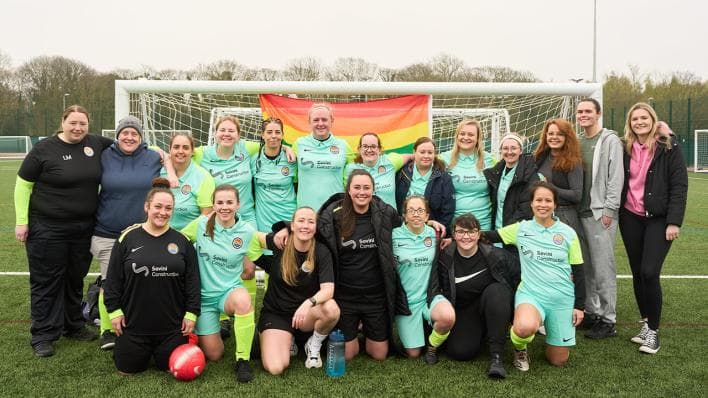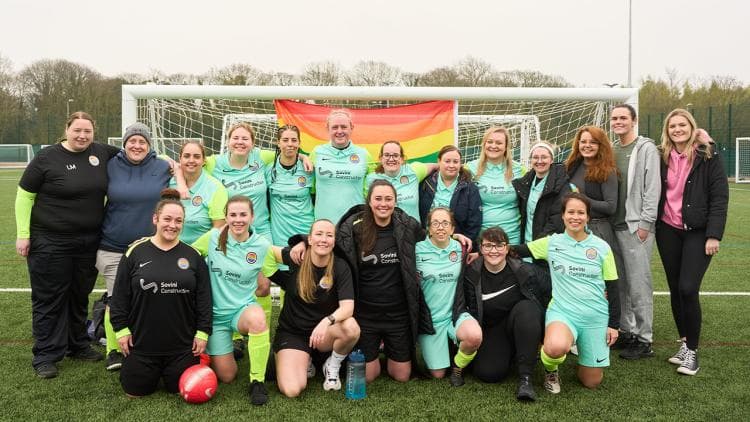Creating community for women and non-binary players at Inclusion Plus FC
11 Aug 2024
Share
![]()
![]()
11 Aug 2024
Share


Inclusion Plus FC is transforming lives on and off the pitch for women and non-binary players in Liverpool.
Whether you’re new to the sport or have been in the game for years, Inclusion Plus FC provide opportunities for everyone to take part in football, building a mental health and LGBTQIA community where players feel supported.
The club compete in Liverpool CFA’s She Inspires League at LCFA Sefton – a state-of-the-art Football Foundation-funded sports facility - and run weekly open training sessions at Bootle FC. They’re also part of the Alternative Football League and compete in other various competitions.
In 2023, Inclusion Plus were awarded Liverpool CFA’s Lioness Award in recognition of their commitment to making football a safer, more welcoming place where players can be themselves.
We sat down with founders, Jassmin and Rhian, as well as Team Leader, Michelle, to find out more about Inclusion FC’s incredible work and how the community they’ve created is about so much more than just football.
How did Inclusion Plus FC come about?
"We started out with five of us kicking a ball around in a field. Eventually, through social media, we were getting more and more players, especially after Lionesses EURO success. We’ve gone from one five-a-side team playing once a month to having four teams playing across two different leagues in only two years.
"For us, we just want to provide as many opportunities as possible for players to play football because we know for so long that it wasn’t possible for us to."
What role does the club play in supporting each other’s mental health?
"Inclusion Plus plays a big part in supporting mental health. The club is a safe space where people can be themselves and feel accepted. Players may not have felt accepted before which can contribute to poor mental health. Once players start coming to us, we’ve seen that they feel a lot more confident.
"And it's not about having a mental health diagnosis either - it’s about reducing the stigma and simply asking ‘how are you?’. We talk about injuries in football yet our mental health ebbs and flows too. Making mental health a normal topic of conversation is the most important thing.
"The more we know and understand the community we’re building, the more we can support one another. We make it clear that we’re not counsellors or therapists but we provide a community that’ll support you through whatever you need.
“It gives people their own circle of like-minded friends. Starting the club is the first time we’ve experienced such acceptance and it’s amazing to be able to share this with others.”
Can you tell us about the mental health workshops you’ve run at the club?
"A player came to us and said she’d like to sponsor a mental health workshop for the club. A mental wellbeing workshop was then set up with a professional coach who took players through different exercises and gave us a lot of tools on ways to support each other and better handle high-pressured stressful situations, whether that be on the football pitch or outside of it. We all took something from the workshop and it was really well-received by the group. Off the back of this, we have plans to expand this offering and do more workshops like this in the future."
What difference have you seen in the players since first starting the club to now?
"Overall, it’s the confidence of players that has really grown and everyone is able to be exactly who they are. Players have said they’ve experienced real improvements to their mental health or that they’re able to manage it in healthier ways. Players are not only improving their football ability, but they’re also educating themselves and each other too. Take pronouns, for example.
"So often, it’s just been the case to use phrases like ‘Man on’ but we make sure that we use more inclusive language like ‘Player on’ and let people know what our preferred pronouns are at the start of every training session."
It’s all about respecting each other’s values.
What can facilities do to be more inclusive for women and non-binary players?
"We’ve had experiences in the past where we haven’t been given enough time before games to access changing rooms or we’ve gone in there after someone else’s game and there’s been issues of cleanliness.
"People have had to change in the foyer before. It’s really important to provide a safe space to get changed and go to the toilet – if it’s your time of the month, you don’t want to be worrying about going to the bathroom and it being clogged or there’s no toilet paper. It’s about facilities minimising the stress."
"Some players do feel anxious about playing football so you don’t want them to also worry about getting changed. Providing a clean changing room that’s open and available is crucial. Facilities also need to be open to feedback and will make changes to improve going forward."
What are your hopes for the future of the club?
"We want to keep on growing and give more opportunities to the players. We’d like to provide more mental health tools and resources, even run our own mental health-focused tournament."